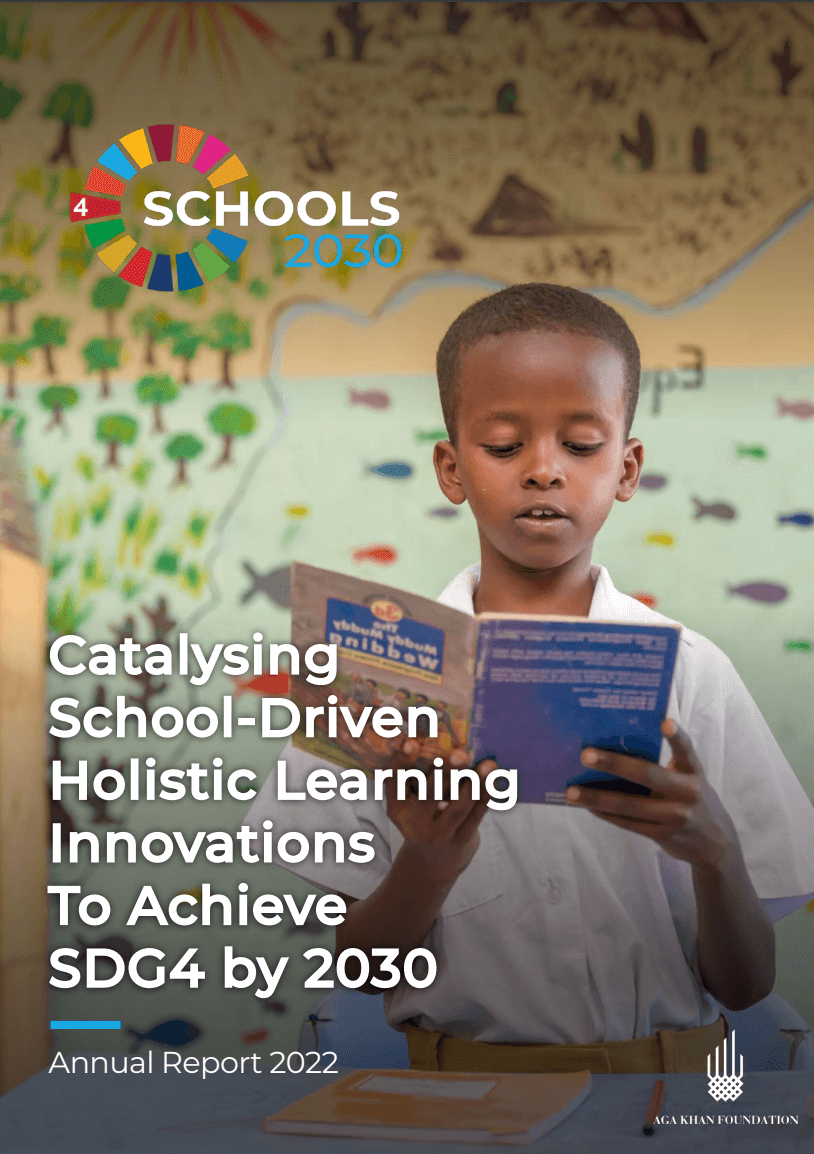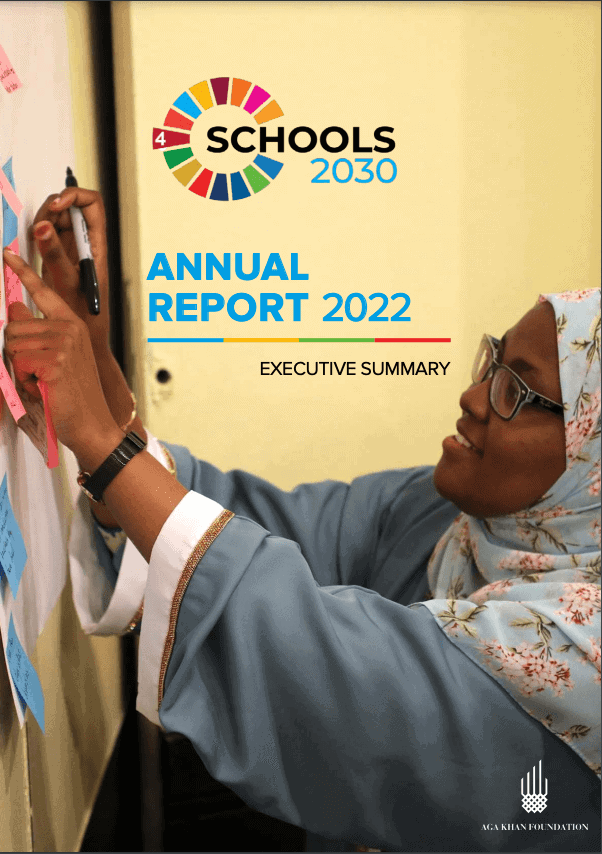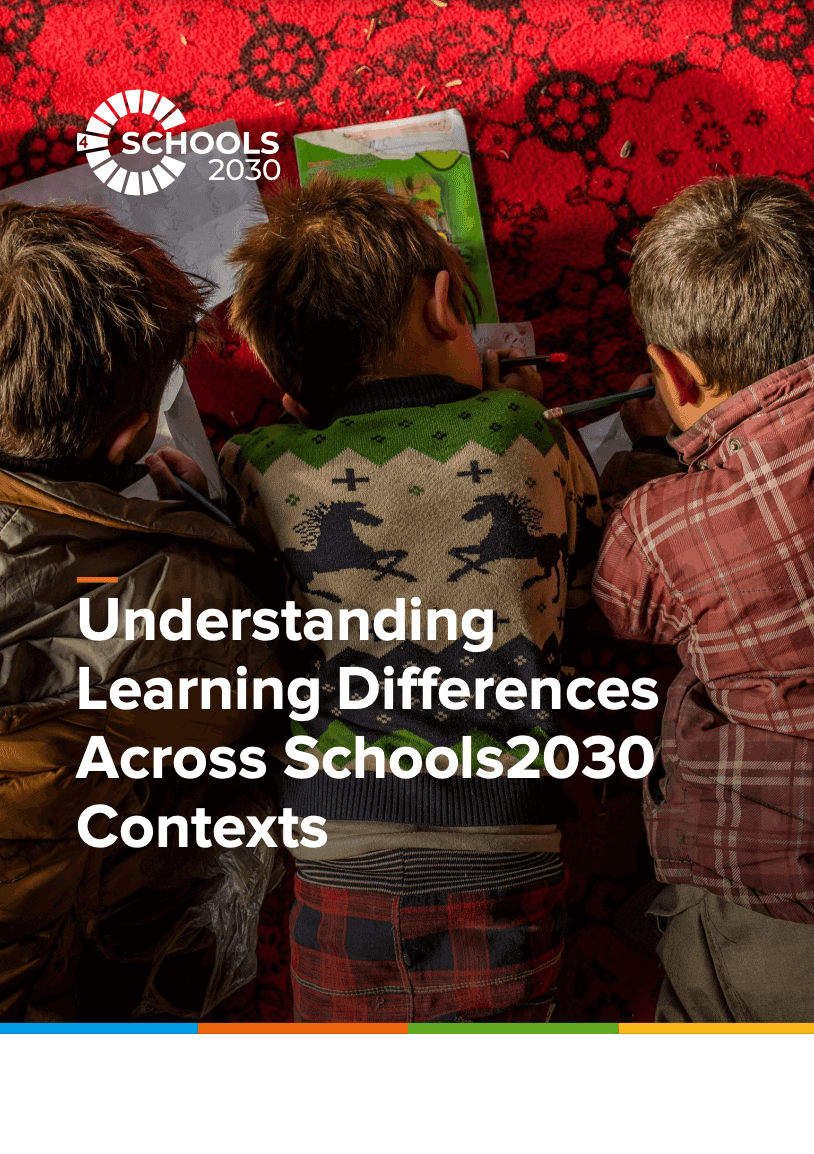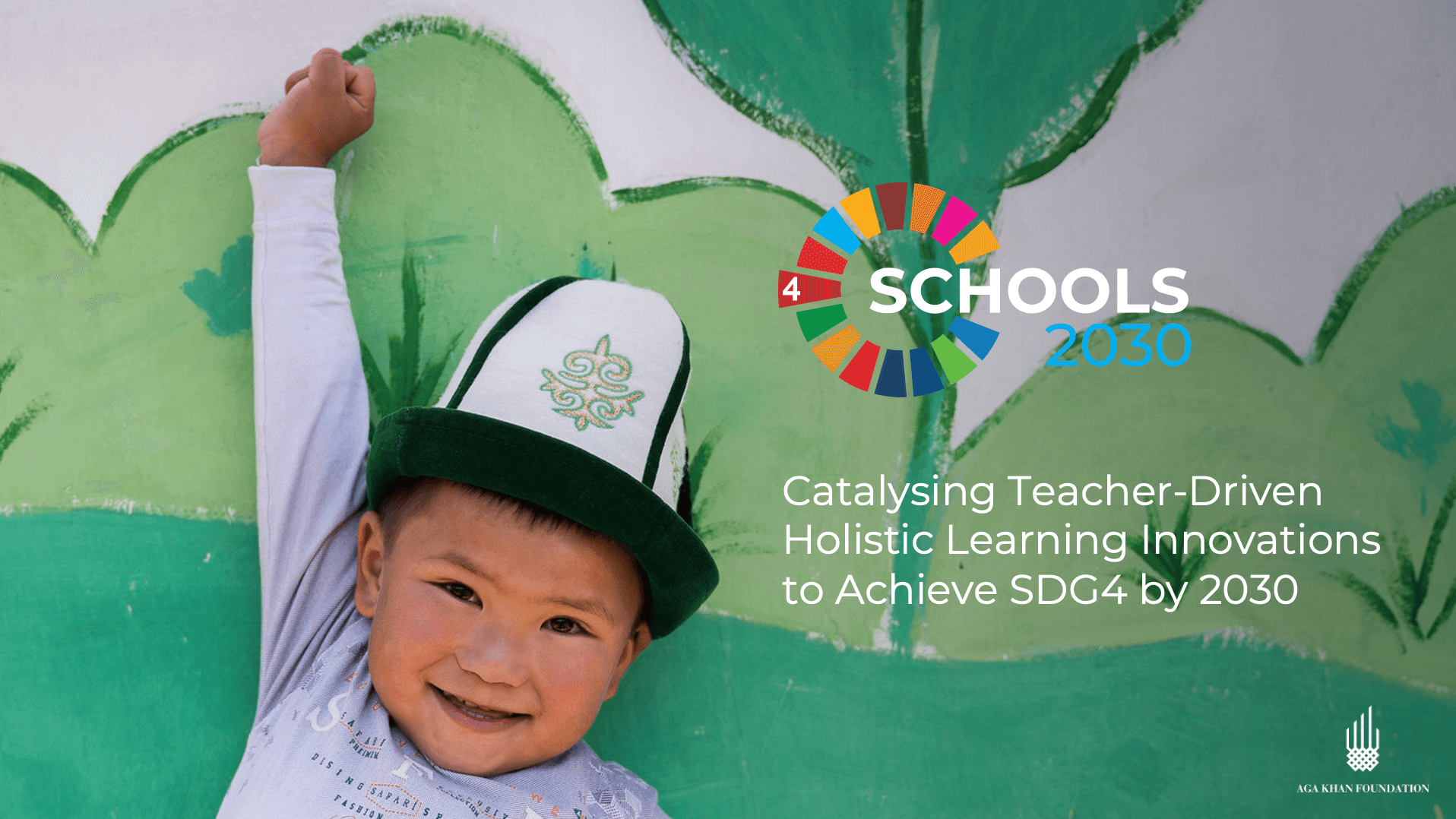Schools2030
Global Research Grants 2023
Grants of up to 150,000 USD for 18-24 months are available for creative, dynamic research teams to generate new evidence in partnership with Schools2030 that explores the nexus between inclusion, learning environments, teacher agency and classroom innovation.
Schools2030 are inviting up to six new global research consortia to join our existing community of Global Research Partners to generate actionable evidence with and for schools and education systems in Schools2030 contexts and beyond.
BACKGROUND
Schools2030 programme
Schools2030 is a ten-year participatory learning improvement programme based in 1,000 government schools and community learning centres across ten countries: Brazil, Portugal, Kenya, Tanzania, Uganda, India, Pakistan, Afghanistan, Tajikistan and Kyrgyzstan. Using the principles of human-centred design and a three-step model for educational change – Assess, Innovate, Showcase – Schools2030 is generating contextualised, school-based, teacher-driven and learner-centred education innovations that inform systems-level approaches about how best to improve holistic learning outcomes in challenging contexts.
Schools2030 works in some of the most remote and marginalised communities characterised by low learning outcomes and low resources. We focus on generating evidence-based, teacher-driven, school-level innovations that benefit learners at their key educational transition years: from preschool to formal schooling (approximately age 5); at the end of the primary school cycle (approximately age 10) and the transition from lower secondary school to higher education, skills training and the world of work (approximately age 15+). For more information on Schools2030’s innovative model please see the Schools2030 website.
Schools2030 coalition
The Schools2030 movement is a global coalition of education stakeholders including teachers and school communities, national and global technical education partners, local and national governments, civil society organisations and donors.
The Schools2030 programme is implemented by the Aga Khan Foundation (AKF) in each country, apart from Brazil where the programme is implemented by Ashoka Brasil through the Movement of Innovation in Education.
Schools2030 evidence
At the launch of our programme, Schools2030, in partnership with the Jacobs Foundation, recognised the critical importance of linking the Schools2030 programme with the wider global education research ecosystem. We are launching our third Global Call for Research to build off the evidence generated thus far on holistic education needs and contextually relevant learning assessments, school-based human-centred design and educational inclusion, and ongoing issues related to learning equity and equality in marginalized contexts. We currently work with nine research consortia who are leading research in collaboration with Schools2030 in seven of the ten programme countries. For details on our previous cohorts of Global Research Partners and funded projects please see here.
Schools2030 Global Research Partners contribute to the global evidence base being generated by the Schools2030 programme. As independent partners, the research invaluably complements outputs from other evidence generating partners within the Schools2030 network, including the Schools2030 National and Global Assessment Partners, Schools2030 National Learning Partners, the Schools2030 Global Evaluation Partner as well as the school-level evidence emerging from teachers participating in the programme. As Schools2030 moves from its “Launch Phase” from 2020-2023 into its “Second Phase’ of connecting “schools to systems” from 2024-2027, we envisage that the next cohort of Global Research Partners will play a vital role in answering key strategic questions and identifying promising pathways for sustainable impact over the next three years of the programme and beyond.
The submission deadline for applications is 23.59pm CET on Sunday 5th November 2023. Successful applicants will be notified via email in early December 2023.
SCOPE OF RESEARCH
Through this new call for research, Schools2030 seeks to better understand key questions emerging from its on-the-ground partners and programme implementation. These include two main threads of research inquiry:
- How does the quality of formal and informal learning environments impact students’ acquisition of knowledge, skills, attitudes and values?
- How should we understand ‘teacher agency’ in different contexts? What is the interaction between teacher agency and innovation at the classroom, school and system levels of the education ecosystem?
Across these two areas of study, we seek to understand (i) the factors that enable or hinder teachers to nurture inclusive learning environments and adopt innovative educational practices, and (ii) how we as the Schools2030 programme can better support teacher agency at the classroom, school and systems-levels for the future of education for all.
We invite proposals that address our key research questions under one of two sub-themes:
SUB-THEME 1: Quality learning environments and holistic learning outcomes
Schools2030 seeks to cultivate more inclusive learning environments and ultimately improve holistic learning outcomes by introducing human-centred design approaches that encourage innovative, child-centred pedagogical practices in the classroom. Teachers are trained and supported with a suite of tools, including AKF’s Inclusive Classroom Guide and a Learning Environment Assessment Tool (the BEQI at preschool level) to encourage them to self-reflect on their practice. Along with learning outcome data, this then helps to inform their human-centred design process with the aim of generating more inclusive classroom innovations that are relevant to the learning needs of their students. As Schools2030 predominately works in schools, educators have focused on nurturing inclusive environments inside the classroom, and therefore our existing dataset comes from school environments. However, we recognise that holistic learning is activated beyond the realms of the classroom – this may be in non-teaching time at school, during times of play at breaks or during after school activities, at home in the family, or in the wider community. For this reason, we are interested in understanding how our existing offering of teacher-oriented tools and resources, and our model for engaging with schools and teachers may better acknowledge and interact with holistic learning opportunities outside the classroom. We welcome creative approaches to investigating this – this may encompass integrating the classroom environment data already being collected through the programme with wider environment data. We ultimately hope that research can offer practical recommendations for the programme on better supporting teachers and schools to foster quality, inclusive learning environments that promote holistic skills development. Existing classroom learning environment data from the programme would be made available to successful research teams under this sub-theme if relevant.
We conceptualise holistic learning as a blend of contextually relevant knowledge, skills, values and attitudes. In each Schools2030 country, a specific set of holistic learning domains spanning academic and non-academic skills has been selected in partnership with Ministries of Education, local education authorities, teachers and other school stakeholders for each age cohort to ensure contextual relevance and alignment to policy and curriculum priorities. Schools2030 National Assessment Partners in each programme country have worked together with the Global Assessment Partner, Oxford MeasurEd, to design contextualised, teacher-led holistic learning assessment tools to measure student learning outcomes in the selected domains. Teachers are using these assessment tools in the classroom to understand the learning levels of their students, and then using this data to inform the development of classroom innovations through human-centred design. Building on the work Schools2030 has already led on conceptualising and measuring holistic learning in the given country contexts, we recognise an opportunity to further investigate how the different holistic learning domains interact, and how this varies in different contexts. Existing holistic learning assessment data would be made available to successful research teams under this sub-theme if relevant.
Our key research questions under this sub-theme include:
1. How does the classroom environment impact students’ holistic learning outcomes (which we define as contextually relevant knowledge, skills, values and attitudes)?
a. What is the nature of the relationship between learning outcomes and the classroom environment data emerging from Schools2030? What role does the school environment play on learning outcomes?
b. How do variables in the wider learning environment (eg. time outside the classroom at school, at home and in the community) correlate with holistic learning outcomes?
c. What implications does this have for the way the Schools2030 model engages with schools as part of a broader learning eco-system that includes parents, families and communities?
2. Schools2030 focuses on different holistic learning domains (5 domains per age group in each country that have been selected at the country level to reflect national education priorities) encompassing academic and non-academic skills. How might these combinations of learning domains relate to or reinforce each other?
a. What interlinkages exist between the holistic learning domains? How does this vary over time/age cohort? (Eg – what happens to maths ability when we simultaneously nurture creativity? What happens to a child’s capacity for empathy when we nurture leadership? Please note these are illustrative examples only)
b. May some domains be considered “gateways” to improved outcomes in other holistic learning domains? Are there some domain combinations that are particularly beneficial to overall improved holistic learning outcomes?
c.When examining holistic domains, how can we consider contextual nuance where the same combinations of domains are being addressed in different contexts? (Schools2030 holistic domains are contextually defined, so “critical thinking” in Kyrgyzstan and in Portugal will not necessarily be defined in the same way, “self-awareness” in Brazil and in India will not be defined in the same way, etc.)
3. How can we support teachers to intentionally foster inclusive learning environments and effectively respond to their students’ diverse learning needs?
a. To what extent do teachers understand what an inclusive learning environment looks like in relation to the varied and intersecting needs of different children?
b. How do leadership/organisational structures (at school, district, regional and national levels) hinder or enable teachers to foster more inclusive learning environments in low-resource and/or conflict affected settings, such as those Schools2030 is working in?
c. To what extent are teachers adapting their practice based on the Inclusive Classroom Guide and intentionally using the Schools2030 Learning Environment Assessment Tools (including the BEQI in preschools) and resulting data to inform their human-centred design process?
d. How might we aggregate classroom-level data on both learning outcomes and the learning environment so it can be used by teachers to inform their HCD process?
e. What further support do teachers need to beable to effectively use this data to address the varied and intersecting needs of their students in the classroom?
f. What implications does this have for teacher professional development provision? How aligned are education systems to teachers’ initiatives in fostering inclusive learning environments? How might we work better with the different organisational structures at school, district, regional and national levels in Schools2030 programme countries to ensure teachers are supported to foster inclusive learning environments?
SUB-THEME 2: Teacher agency
We believe that enhancing teachers’ capacity to measure, design and implement education innovations in the classroom, as well as increasing opportunities for teachers to engage in education sector dialogue are key pathways to achieving SDG4. We recognise and seek to amplify teachers as leaders, innovators and active agents in education reform. In our Theory of Change, we connect teacher agency to professional shifts in mindsets and the adoption of innovative practice, which we posit to be conducive to improving holistic learning outcomes for all children. Nevertheless, there is a need to delve deeper into what is meant by “teacher agency”, how this is valued and perceived in different contexts, and how teacher agency does (or does not) lead to improved classroom practice.
Our key research questions under this sub-theme include:
1. What does teacher agency look like in Schools2030 countries?
a. How do leadership/organisational structures (at school, district, regional and national levels) hinder or enable teachers to have agency? What are the policy and school leadership enablers and constraints shaping the status of teachers in low-resource and fragile settings, such as those Schools2030 is working in?
b. What influence does the relationship between the political environment and teacher status have on education innovation in the classroom and teacher practice?
c. What value is assigned to teachers having agency? How should we define teacher agency for the contexts in which Schools2030 is working?
d. How should we define and understand teacher wellbeing in relation to teacher agency in the different Schools2030 contexts?
e. What are the pathways to promoting teacher agency in Schools2030 contexts? What partnerships are critical for teachers to be able to have agency and be innovative – at school, district, regional and national levels?
2. How does teacher agency lead to teacher mindset shift, and in turn to innovative practice in the classroom?
a. Under what conditions do teachers adopt and embrace new ways of teaching that can lead to education innovation? What are the enabling cultural, professional, and personal factors that promote long term behaviour change among teachers in Schools2030 contexts? How does this vary by context?
b. What aspects of the Schools2030 programme (whether this be tools, resources and training, or the more affective elements such as affiliation to the programme, opportunities for showcasing and peer/stakeholder networking) support teacher agency? How can we improve existing Schools2030 tools, training and other aspects of the programme to better up-skill teachers for new ways of thinking, particularly where there is no internet access?
c. How can we better support teacher readiness for change as a long-term vision over the course of the Schools2030 programme?
d. Does participation in Schools2030 activate more positive teacher self-perception? If so, does this lead to improved practice?
e. What implications do the above questions have for current pre-service and in-service teacher training programmes? How might teacher training programmes need to change to ensure levels of teacher agency increase in the future generation of educators?
We are also interested in the interaction between the two sub-theme topics:
3. What is the nature of the relationship between teacher agency and inclusive learning environments?
a. What happens to the learning environment when teacher mindsets shift towards new ways of teaching?
Primary evidence building with the Schools2030 programme
We invite proposals from research teams that include Schools2030 schools in the sample to be studied. Schools2030 Global Research Partners work closely with Schools2030 teams, partners and teachers in the countries of study to deliver their research projects. As such, Schools2030 research projects are research-practice projects that require local knowledge and expertise in working directly with teachers and programme implementers in the chosen context(s) of study.
For example, research teams independently design their own research methodologies, research questions and objectives, but communicate with Schools2030 country teams on data collection timelines, sampling, research tools and research dissemination activities. While Schools2030 country-level teams will provide critical linkages to research activities, proposed primary data collection and research should be led and organised by the proposed research team at the local level. If relevant to the proposed project, pre-existing Schools2030 data related to children’s learning outcomes and/or the classroom environment can be made available to appointed research teams where available.
Schools2030 Global Research Partners join a global community of researchers working together with the wider Schools2030 network made up of technical partners, practitioners, and national and global teams. The opportunity to join the Schools2030 coalition brings a wealth of opportunity to learn side by side with fellow Schools2030 colleagues and teachers from all over the world, and Global Research Partners are expected to be active members of our community joining us at online and in-person events.
Successful research teams will be expected to:
- Include Schools2030 schools as part of their research sample
- Be composed of local research partners with expertise in the selected context(s) of study
- Be responsible for all data collection
- Plan for participatory research dissemination activities in partnership with Schools2030 and partners to feed research findings back to school level stakeholders, including teachers
- Proactively engage and collaborate with the Schools2030 community, including with fellow Schools2030 Global Research Partners
SUBMISSION GUIDELINES
Who can apply?
We welcome proposals from diverse, global research consortia, and are particularly interested in hearing from research teams at institutions based in Schools2030 countries.
- We invite new approaches to how the activities, data, and partnerships across the Schools2030 programme can help researchers addresses key gaps in the available evidence on quality learning environments and/or teacher agency.
- We invite single or multi-country studies that leverage the work and activities across the Schools2030 1000 government partner schools in ten countries and encourage approaches that work in partnership with local stakeholders.
- We invite research that builds on the existing work Schools2030 has led on conceptualising and measuring holistic learning in the ten programme countries, and on the existing suite of Schools2030 holistic learning assessment tools, teacher instructional materials and datasets relating to classroom environments.
- We invite creative, innovative approaches for generating new, rigorous evidence around the specified sub-themes that make significant contributions to knowledge.
- We have a strong preference for participatory research methods and mixed methods approaches.
- While Schools2030 country-level teams will provide critical linkages to research activities, proposed primary data collection and research should be led and organised by the proposed research team at the local level.
- Research teams should specify which sub-theme(s) they wish to address, the country/countries of study, as well as the age cohort(s) they plan to study.
Your application must include the following five components:
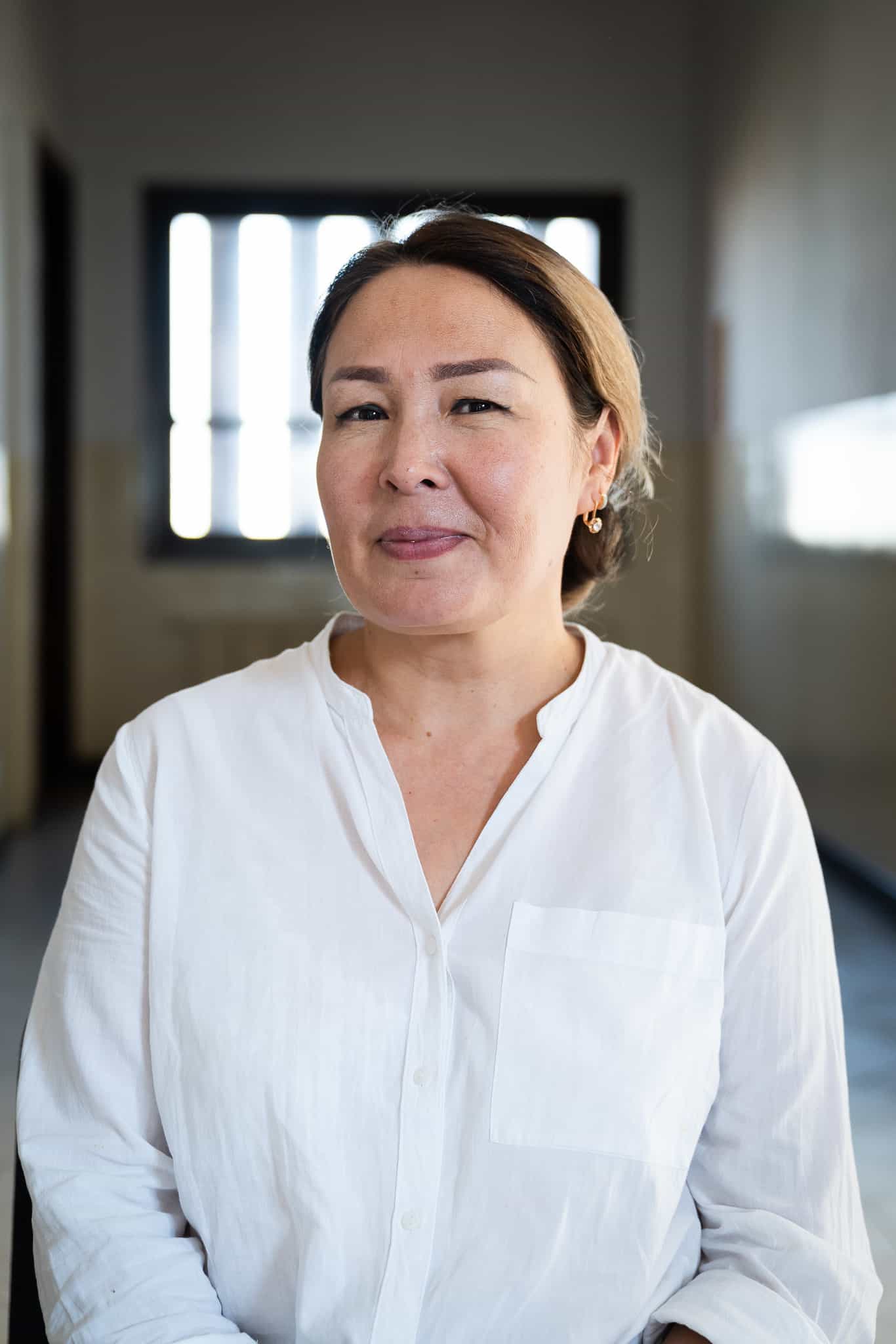
1. Project title and summary
Provide a plain language summary of your proposed project, including which sub-theme is to be addressed, countries and regions targeted, expected outcomes and impact, and strategy for knowledge mobilisation. Outline the research objectives, questions and methodology. Note: if your proposal is selected for funding, this summary would be used publicly to communicate the results of the competition.
2. Applicant Information
Please include the following details:
- Lead Organisation;
- Project Leader;
- Key Project Team Members;
- Consortium Rationale (if applicable)
3. Gannt Chart for Project Timeline
18-24 months; earliest start date March 2024.
4. Itemized Total Budget Requested (Up to $150,000)
Prospective grantees are expected to budget for the lead researcher to attend 1-2 international conferences during the course of the research project to share progress and disseminate findings. As an indication, Schools2030 Global Research Partners have presented collectively on panels at the CIES, BAICE and UKFIET conferences which take place in the USA and in the UK. Research partners are expected to cover costs associated with attending conferences and events from their research grant. Please note that the lead researcher will also be invited to the Schools2030 Global Forum, held every year in June. Costs for partners travelling to and attending this event are included in the Schools2030 budget and are not expected to be covered by the research grant.
5. Research Proposal
5a. Problem Identification and Research Purpose (max. 1000 words)
- Justification: Clearly state the problem or opportunity to be addressed in your research project and how this relates to the overall programme aims of Schools2030.
- Research Focus Area: Explain how the problem or opportunity is aligned to at least one of the two sub-themes listed in the Call for Research (Learning environments or Teacher agency).
- Research Objectives and Research Questions: Clearly state the proposed project objective(s) and the research question(s) you plan to answer. This includes general and specific objectives of the research. The general objective should state the goal being pursued. The specific objectives should indicate the specific types of knowledge to be produced and the audiences to be reached.
- Addressing Gaps: Explain how the research question(s) addresses current gaps in educational research.
- Outputs and Outcomes: Describe what the proposed project will produce in terms of outputs, and the outcomes and intended impact to which it will contribute.
- Equity and Inclusion: Articulate how the research will promote education equity and inclusion.
- Local Capacity: If applicable, please provide information about how the project will build capacities of school-level stakeholders and/or local research and learning institutions.
5b. Research Design and Methods (max. 500 words)
- Overall Framework: Describe the conceptual or theoretical framework to be used, the study design, methods, and type of analysis.
- Participants: Describe how relevant stakeholders, whether local, national, or international, will be involved in fair and equitable partnerships during the project.
- Risks: Identify risks to achieving the research objectives and strategies for mitigation.
5c. Knowledge Mobilisation Strategy (max. 500 words)
- Engagement: Provide an overview of how the activities and outputs of the project will engage potential knowledge users, including school-level, national-level, and global-level stakeholders.
- Dissemination: Provide details on the dissemination strategy for research outputs, including (but not limited to) peer reviewed publication, as well as how research results will be shared with stakeholders involved in the research, including at the school level.
- Impact: Provide details on how this research could impact education policy and practice, and the strategy to develop and maximise this impact.
5d. Research Ethics (max. 250 words)
- Ethical Considerations: Provide details of the potential ethical issues in relation to the proposed research and what steps will be taken to ensure the highest ethical standards and the greatest protection of research participants.
- Research Approval: Note that prior to commencing research applicants will need to obtain approval form from an official institutional or national research ethics body and will need to comply with the terms and conditions of the Grant agreement. Please indicate your capacity to acquire this in the focus countries of research interest.
5e. Research Team Capacities (max. 1,000 words)
- Project Team – Provide details of the project team including the position and qualifications of the project leader and other team members.
- Track Record – If more than one organisation is part of the proposal, provide a brief overview of the track record of each organisation relative to its proposed role in the project (limit to high-level bullet points; hyperlinks to previous work will be reviewed).
- Example of Previous Work: Provide example(s) of recent relevant educational research experience in developing countries.
5f. References
The submission deadline for applications is 23.59pm CET on Sunday 5th November 2023. Successful applicants will be notified via email in early December 2023.
Proposal evaluation criteria
Proposals will be evaluated by an independent panel who will assess submissions based on whether they can demonstrate: an understanding of the existing literature and evidence base as relevant to the selected sub-theme; a context appropriate, participatory research design and methodology; plans for involving relevant stakeholders fairly in the project; and plans for actionable outputs that will be relevant to Schools2030 stakeholders, and in wider education practice and policy. Proposals will also be reviewed by relevant Schools2030 country teams.
Partner requirements
- Selected partners will be subject to the Aga Khan Foundation’s due diligence and safeguarding assessment processes and will be required to review and sign a grant agreement covering the action in a timely manner.
- Shortlisted teams will be asked to confirm whether they would be able to complete the process within a specified timeframe if selected, and will be asked to share relevant policies for due diligence purposes.
- In the case of research consortia, AKF will sign an agreement with one lead organisation and subgrant to this lead grantee. The lead grantee takes full responsibility for the administration of the grant to fellow consortium members.
- Prospective grantees are expected to budget for the lead researcher to attend 1-2 international events over the course of the research project to share project progress and/or disseminate research findings. Research partners are expected to cover costs associated with attending conferences and events from their research grant.
- The selected partner shall have full responsibility to oversee the implementation and project management of the grant, coordinate the reporting requirements and consolidation process for submission to AKF (UK), ensure compliance with donor guidelines and grant terms and to submit cash requests to AKF (UK) for funding managed through AKF (UK).
- The partner contract will be governed by, construed and interpreted in accordance with the laws of England and Wales. Every effort shall be made to resolve any disputes arising in connection with this contract in an amicable and informal manner.
- Selected partners must strictly adhere to the AKDN Code of Conduct and Global Safeguarding Manual or otherwise adhere to its own local Safeguarding Policy if one exists and if agreed with AKF (UK). The partner must also strictly adhere to AKF (UK)’s Anti-Bribery and Corruption Policy, AKF (UK)’s Anti-Fraud Policy and AKF (UK)’s Anti-Slavery Policy.
More information
If you have any questions and would like to get in touch please contact Ellen Smith, Schools2030 Global Research Officer, at [email protected].

